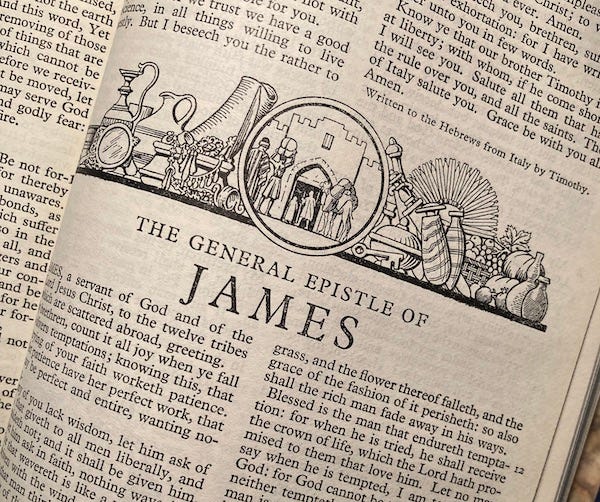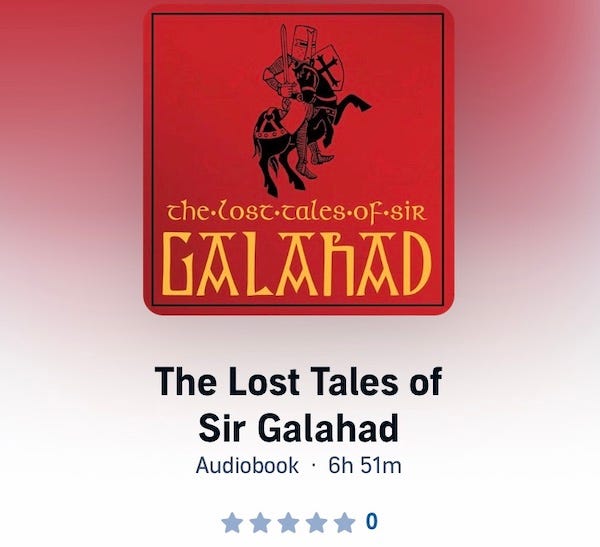Last month our church started a sermon series on the book of James, which means, per usual, Kraig and my Sunday class is going through it inductively. The class we teach is a Bible study methods class, and for a number of years, our practice has been to take the Bible passage that will be preached on in the service and work through it with our class in the hour before the main meeting. We break it down, make observations, ask questions…and when I say “we” I mean the whole class. Everyone gets in on it. Kraig and I love it, and we have a good assortment of folks who come regularly enough to show us they enjoy it, too. Every week I go in with anticipation of what new things I’m going to learn, and that’s after doing my own prep study for the class.
The book of James—or better, the epistle—is one of the trickier books of the New Testament. For one thing, James1 is writing from a distinctively Jewish Christian mindset, and writing to Messianic Christians of the early church. As a result, the structure of his letter is nothing like Paul’s Gentile-focused, and so Western-structured, epistles of Romans and Ephesians (and so on). Where Paul tends to present his arguments in a fairly straightforward manner, a+b=c, and layers one doctrinal point on top of another before handing out some practical application, James presents some thoughts and points, then presents some other points, then circles around to a few of the first thoughts and points, then elaborates on more ideas, etc. Following it is more like navigating a three-dimensional maze than working out a puzzle. Kraig delights in it particularly. Having grown up in Africa, there are times when his thinking process is decidedly not Western, and so James’ letter feels a little like home to him. I enjoy exploring a work that doesn’t follow my normal thinking process and discovering the connective gems.
Every time I come to the book of James I feel like I have to navigate the whole faith and works dilemma all over again. A cursory read of James might make it seem that he’s saying you have to have works in addition to faith in order to be declared righteous by God. Of course, the reality is that’s not at all what he’s saying, but I feel like I have to relearn this every time I study the book. This time through that lesson has come more easily, though. Perhaps I’m finally grasping some of these concepts. One can only pray that repeated study and application will eventually stick….
I think this is one reason why it tends to be a sticky subject: in our Western mindset we tend to break things into particulars. We’re really good at looking at separate pieces. This is an excellent skill for analysis, and it’s led to fantastic scientific breakthroughs. I mean, if it hadn’t been for observation and analysis, penicillin might never have been discovered! That said, breaking things into pieces is pretty lousy for theological concepts like the trinity, or the incarnation, or the body of Christ (the church), or faith and works. The reality is, faith and works are as inseparable as the trinity. “‘You have faith and I have works,’” James quotes a hypothetical “someone,” then replies, “Show me your faith apart from works, and I will show you my faith by my works.”2 It’s impossible to show a heart state without some kind of action. In chapter one he instructs his audience to “be doers3 of the word, and not hearers only,” because someone who only hears and doesn’t do is like a person who glances in the mirror, but then leaves and forgets what he looks like4. This person hasn’t put anything he’s heard into practice; his faith is without works, and so it really isn’t faith at all. Faith without works is like head knowledge without any application or life-transformation, like a marriage where you and your spouse never talk to each other (much less show affection), like a pecan tree that never produces pecans (we won’t count our trees that do produce pecans, but give them all to the squirrels). It’s kind of silly to think we can just believe and that’s all that’s needed. Believe what? For what reason? There has to be an object of our faith, and a response, or we don’t really have it.
There’s something about working through this concept in James this time through that has really struck home for me. In some ways it’s so simple: if we truly love God and have a relationship with him, that love will overflow into a response and action. Just as the trinity is the foundational reality of harmony, so our love for God and his for us can be a harmony of relationship. But we like to make the concept complicated because we want our itemized checklists. How do I know I’m saved? If I have faith. How do I know I have faith? I have works. Which works are on that list? Are the things I’m doing actually the works I’m supposed to be doing? Did I check off the right item? If I didn’t, then does that mean I don’t actually have faith, and that I’m not really saved? It’s so easy to get tied up in knots, and, as a result do nothing. If instead we focused on our relationship with God, loving him and relishing his love for us, then inevitably that will pour out from us in the ways “which God prepared beforehand5.” We are his workmanship, after all, his masterpiece, his poem. Maybe we should let him determine what our work will look like.
1 Fun act: The name “James” in the original Greek is actually “Iakobos” or, as we would say, “Jacob.” It was codified as “James” in the 1611 King James Bible, but apparently was used as early as Wycliffe’s translation. James is commonly accepted as the half-brother of Jesus, and shows up in Acts and Galatians, referred to as a pillar of the early church.
2 James 2:18
3 Here’s another fun fact: The word “doer” in Greek is “poietes.” Obviously in the context James is using it it’s someone who is obeying the word, but it’s specifically defined as “a performer; specially, a ‘poet’” (Strong’s G4160) I love that!
4 James 1:22-24
5 Ephesians 2:10, and “workmanship,” by the way, is “poiema”—there’s that poetry again….
Art for the week
Speaking of beautiful works, here’s one from Ev:
Check out Daughter of Arden at Bandersnatchbooks.com, along with other great titles.
Remember you can now listen to The Lost Tales of Sir Galahad, published by Rabbit Room Press, has released an audio recording narrated by the delightful voice of Simon Vance (he even pronounces “Warnemuende” correctly!). I have two stories in this collection, and share these pages with many friends from The Habit and The Rabbit Room. It’s worth a listen—just sayin’!
You can find links to more of my writing at A Shaft of Sun Through the Rain and my old blog, Willing, Wanting, Waiting.








Beautiful reflections on a complicated topic! Any discussion of faith and works takes me back to high school. I was born and raised Catholic but I spent most of my growing up years in parts of the country where I was in the minority. In SE New Mexico, where I went to high school, I used to get a lot of questions from other students and even teachers on theological questions, often out of the blue. Faith vs Works was a very popular topic and my stance, as well as the Church’s teaching, was very much your conclusion. Faith is a relationship with God that bears the fruit of works. The two are inseparable and Jesus tells us to feed the hungry, clothe the naked, visit the imprisoned, and so on otherwise He won’t know us at the Final Judgement. We can’t compartmentalize faith, it must overflow or it will wither. We can’t love and believe in God and refuse to see Him in His created beings. And in seeing them, we should be called to action. Yet we fall short and always will fall short, which is ok because we can’t save ourselves, we can’t do anything without God’s grace and faith. That is what so many political structures get wrong, we can’t save ourselves, wipe out all hunger and need, but our task is to strive throughout this life and try. And in the striving we get closer , with God’s grace, to who we were meant to be and help others to see Him.
Your comments on James’ writing style made me think of Chesterton. When I first started reading his writing, it was a bit confusing because he structured his points so differently than I was used to. Over time my brain was rewired and it became easier. It would be interesting to compare the two styles for similarities.
Thank you for sharing this piece!
I read the James again this week after seeing someone on Instagram claim James didn’t understand the Gospel, since the other church leaders in Acts 15 had to correct him on circumcision. As I was reading it I was struck by how similar his tone is to Jesus’ in his many sermons, telling needy people to obey God and receive eternal life.
Sometimes this word is hard to receive because we work so hard against a theology of “earning,” but like you say here, God is a God of synthesis! He can’t be boiled down to simplistic one-liners. Faith means accepting that if His ways are higher than mine, I can’t expect to fully understand how all the parts of Him work together.